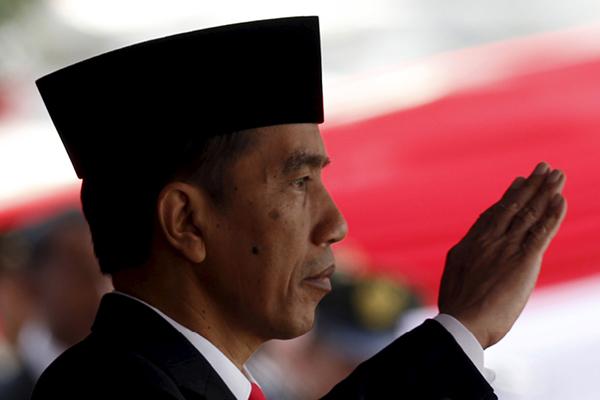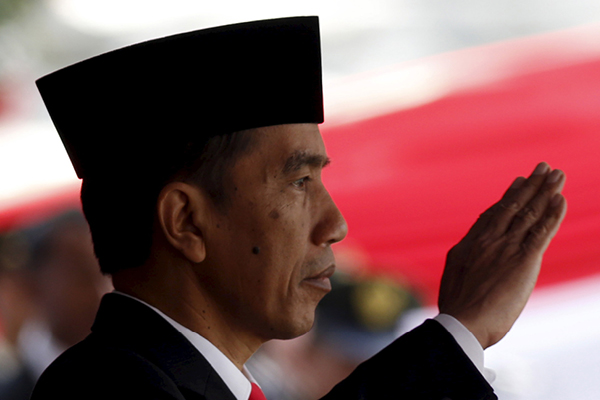
Less than a year since taking office, Indonesian president Joko Widodo’s scorecard is decidedly mixed, with attempts to reignite the stalling economy and increase investment thwarted by delays, bureaucratic infighting and vested interests. But infrastructure remains an area of great promise, with some $22 billion earmarked for projects this year alone, and law firms are looking to tap into that potential. Ranajit Dam finds out more
If Jokowi – as Joko Widodo is popularly known – the presidential candidate was expected to inspire radical change, Jokowi the president has been less than inspiring in his first several months in office. Hampered by the lack of a parliamentary majority allowing him to push through all the reforms he would like, he has found himself repeatedly thwarted by delays, bureaucratic infighting and vested interests. The rupiah hit a 17-year low recently, and growth has slowed to its weakest in six years.
But not all is gloomy. Despite all these challenges, he has delivered on some of his promises that investors say are key to setting Indonesia on the path to sustainable economic growth, including slashing fuel subsidies and revamping the budget to boost infrastructure spending.
Lawyers like Abadi Abi Tisnadisastra, founding partner of Indonesian law firm AKSET, feels it is too early to recognise the Jokowi administration’s achievements, as all of the president’s reform agendas are currently ongoing. “However we can sense positive vibrancies on current government flagship programs such as the commitment to boost infrastructure development and encouraging investment,” he says. “Infrastructure-minded policies include the decision to cut fuel subsidies, saving a sum of around 240 trillion rupiah ($17 million), which would be allocated for infrastructure development, as well as the 35,000 MW power plant construction program.”
Tisnadisastra adds that investment is getting its fair share of the limelight as hundreds of different licenses are streamlined from various government institutions to the Indonesia Investment Coordinating Board (BKPM). “Recent reformations in land regulations are also expected to resolve settlement issues faced by investors in Indonesia, especially for infrastructure and PPP projects,” he says. “On the other hand, PPP reformations have yet to be executed. So far, implementations of key projects under the PPP model have been disappointing, much to the frustration of both the public and private sector. On another note, we have only seen a small support for domestic businesses in boosting their exports in order to reduce the country’s trade deficit, which has been a problem since the twilight of the previous administration.”
To support his reform programs, says Tisnadisastra, Jokowi and his team need to immediately identify and amend certain regulations and policies that may obstruct national growth. “This has been pursued recently by the government through an economic policy package, which will include tax and other incentives aimed at supporting the industries—particularly the oil and gas refineries and infrastructure,” he adds. “The government will however have to make certain the newly introduced policies are well implemented and are not in conflict with prevailing rules.”
Chandra Kurniawan, an associate with Ivan Almaida Baely & Firmansyah (IABF), says he hasn’t seen “big progress” since Jokowi came to power. “Yes, the political and security situation are quite stable now, plus his will to build Indonesia and his focus on maritime and infrastructure remain consistent,” says Kurniawan. “However there is a lot left to be accomplished. The current situation may seem disappointing and rather than laying all the blame on the president we should work together and not expect instant results, reforms take their time. Law enforcement, economic growth and the political system are the main sectors that need immediate and important reforms.”
Back to topMORE ABOUT POTENTIAL
In the past year or so, Kurniawan says he has heard of corporate work slowing down, but disputes, which are what he specialises in, have risen.
For Tisnadisastra as well, this year has been something of a sobering one. “Investor confidence was high in 2014, and it was estimated that Indonesia would perform beyond expectations in 2015,” he says. “However, as we approach the last quarter of 2015, it would seem that this outlook cannot be maintained, mainly due to the global economic situation and slow execution of capital expenditure for infrastructural development.”
However, despite the slump, foreign investors continue to show interest in Indonesia’s future potential. “We have been representing an increasing number of clients exploring opportunities and entering into a wide range of sectors, especially in consumer-focused industries, such as financial services, property and manufacturing of goods, to meet local market demand,” says Tisnadisastra. “We’ve also seen an increased interest in the electricity sector, which is a positive response to the government’s 35,000 MW power plant construction program. While it may take some time for the major electricity projects to kick-in, we are also representing clients with their investment and negotiation with PLN [the stateowned electricity company] for development and operation of renewable energy based power plants, such as solar, hydro and wind. We expect the appetite to invest in mid-scale investments with shorter ROI period such as in power plants and other industries to continue.”
Back to topINFRASTRUCTURE KEY
One recurring theme throughout Jokowi’s presidential campaign, as well as his presidency till date, has been his focus on building up Indonesia’s infrastructure. At the World Economic Forum on East Asia meeting in Jakarta in April, he spoke of the need for the Indonesian economy to shift from consumption to production and to an increased investment in infrastructure, industry and human capital. Earlier this year, he announced that the government would be investing a record $22 billion in infrastructure projects.
Equally telling were the tax incentives extended by the government last month to “pioneering” industries such as oil refinery and infrastructure to help attract more investment. Indonesia is now offering a tax reduction of between 10 and 100 percent for up to 15 years to firms investing a minimum of 1 trillion rupiah ($71.5 million) in industries like maritime transport, telecommunications, downstream metal production and agricultural processing.
Tisnadisastra of AKSET calls infrastructure- related projects a market with “very high” potential. “Our firm has continued assisting clients in developing their investment in public seaports and railways in Kalimantan, Sumatra and Java,” he says. “While we have seen a growing number of infrastructure projects being offered to investors, implementation and execution are always challenging. Proper project assessment needs to be made by the clients to initially identify potential exposures. We also note that without concrete and consistent government guidance and incentives, it will be difficult to realize these investments.”
Kurniawan says that his firm has been handling a number of infrastructure projects, as it looks to tap into this potential. “Foreign firms should feel safe in investing in Indonesia since its economy, security and legal practices are conducive for investment,” he notes. “We provide thorough guidance and advise on any potential risks they may face with their investment in Indonesia.”
Additionally, in July, Indonesia’s Financial Services Authority (OJK) issued 35 policies aimed at stimulating the economy. These rules covered the banking, capital market and non-bank financial industries, as well as consumer education and protection, and included developing the repurchase agreements market and encouraging small and medium businesses to pursue initial public offerings.
“These policies which are intended to stimulate the domestic economy will be invaluable in the long-term, especially in facing the upcoming 2015 ASEAN Economic Community (AEC),” says Tisnadisastra. “The intention to develop a repurchase agreements market is important to create certainty, currently these types of transactions are lacking in transparency, regulations and guidelines.”
He adds that the policies focused on empowering micro and small businesses— which play a critical part in Indonesia’s economy—should also provide them with the means of access to capital, such as obtaining loans, encouraging microfinance institutions, as well as going public. “OJK expects that with the creation of a third board, focusing on micro and small business will give capital access to such businesses and attract more investors to invest in the stock exchange,” Tisnadisastra notes. “This is in line with the Indonesian stock exchange’s recent policy in trying to make it easier for certain companies to list shares on the exchange. We hope that these recent OJK policies will lead to an increase in both investment and growth, in addition to building up Indonesia’s resilience to external shocks from the global economy.”
Kurniawan of IABF says that his firm “appreciates and supports” these policies. “It is expected to boost the economic condition which is now slowing down,” he says. “Repurchase agreements must have specific regulations as it can be categorized as a loan agreement or sale and purchase agreement to give more certainty to the parties.”
Back to topROAD AHEAD
Kurniawan says that the key to attracting foreign investors lies with effective policy changes and resolving long-standing bureaucratic problems. “The Indonesia Investment Coordinating Board [BKPM] is often inconsistent in its policies and investment issues. Such inconsistencies can set a very bad precedent and threaten the investment climate. Clarity and consistency are key to the investment process in Indonesia. It’s not just the banks that should drive these measures; government bodies should do their part as well. The Ministry of Manpower, for example, could provide more clarity on the new regulations regarding the obligations of an employer in obtaining work permits. Broad and illogical interpretations of such laws could set a bad precedent and hinder Indonesia’s reputation as being a safe destination for foreign investors.
Tisnadisastra echoes the call for consistency. “The role of foreign direct investment continues to be a vital factor in boosting growth,” he says. “The current administration is carrying out efforts to make it easier for investors to do business in Indonesia, such as providing a one stop service for investors, and simpler requirements for foreign citizens to work in Indonesia. One hindrance to investment, which has been plaguing the Indonesian government, is constant change of policies. As such, while identifying potential areas for economic growth, the government must anticipate and analyze possible outcomes before establishing policies. This will avoid having to revise policies in the short-term, hindering investment plans of businesses in the process.”
Similarly, legal and regulatory certainty are also vital. “Establishing regulations to protect the interest of stakeholders and providing legal certainty is also important, considering that the notable concerns in investing in Indonesia are corruption, legal uncertainty and an unreliable judicial system,” Tisnadisastra adds.
Back to top